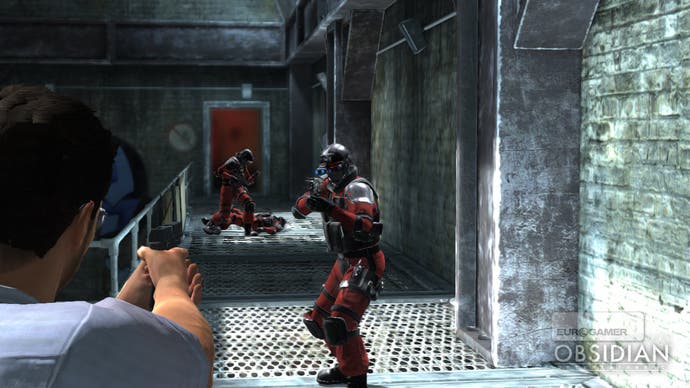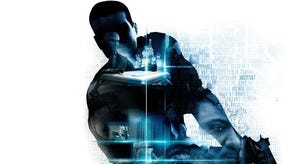Alpha Protocol
License to skill-points.
Alpha Protocol's theme helps, of course - you're not Sir Amnesiapants, with a fixed destiny to save the entire world, even if you are a tad prone to biting the heads off children en route. You're a spy. Spies do bad stuff as part of a grander plan to achieve their mission. In a sense, your morality is already fixed by the character you play as - you're always going to be Michael Thorton, Super-Spy, with a remit to bring down threats to civilisation (though there are strong hints you'll be deciding which threats are ultimately greatest). You can choose to give Michael a silly beard or a bald head, but while that makes the cut-scenes funnier, it doesn't change their outcome. He's a man with a job to do, and he'll achieve it by whatever means he and therefore you deem necessary. "We try and make it so there's no bad choices," says programming producer Nathan Davis. "We want to reward you for playing in the style that you want."
This includes the combat as well as the conversation: the pow as well as the pow-wow, if you will. While superficially the action and the levelling up/abilities system is reminiscent of Mass Effect, it's a lot more integral to the game as a whole, as opposed to an extra lump stuck on the side. There isn't, it appears, much in the way of wandering around hub locations picking up quests and making idle chat-chat: the conversations happen during missions, and then shape the directions those missions go in, and where you go next. On the one hand, this promises a tight flow and a naturalistic narrative, rather than the strange, ancient RPG hangover that sees guys delay saving the entire world to go find someone's lost teddy bear in the hope of earning a few coins and a pat on the head. On the other, it could severely limit the sense of world and place, in favour of a series of arenas with cut-scenes in between.
On the other, other hand, the one with knuckles made of steel, those arenas are impressively flexible. Wanna kill everyone? Kill everyone. Wanna avoid everyone? Avoid everyone. Wanna kung-fu everyone? Kung-fu everyone. Wanna, er, gadget everyone? Gadget everyone. This is a game chock-full of toys. Again, the game responds to what you do, rather than boxing you into a corner - keep on kung-fuing folk and you'll be rewarded with perks for it (many of which are paired with Achievements/Trophies) that unlock ultra-attacks. Switch to sub-machine-gunning goons in the face and you'll earn a few perks from that too. Again, there's that shining promise of replay value - a game that shifts down new paths in on-the-fly response to your actions is never going to play the same way twice.

On the other, other, other hand, the one with seven fingers and weeping sores on the palm, it's not an especially pretty game in either its technology or its art style, none of the demonstrated characters stick out as especially memorable and some of the dialogue seems a little stuck between the rock of run-on exposition and the hard place of attempted James Bond camp. Again, though - it's impossible to demonstrate an RPG in anything less than several hours if you want to convey a meaningful sense of what it's like to lose yourself in the character. And that's what Alpha Protocol aims to do above and beyond anything else. You're a secret agent, after all. Nobody tells you what to do - except you.
Alpha Protocol is due out for PC, PS3 and Xbox 360 in October.










.png?width=291&height=164&fit=crop&quality=80&format=jpg&auto=webp)




.jpg?width=291&height=164&fit=crop&quality=80&format=jpg&auto=webp)
